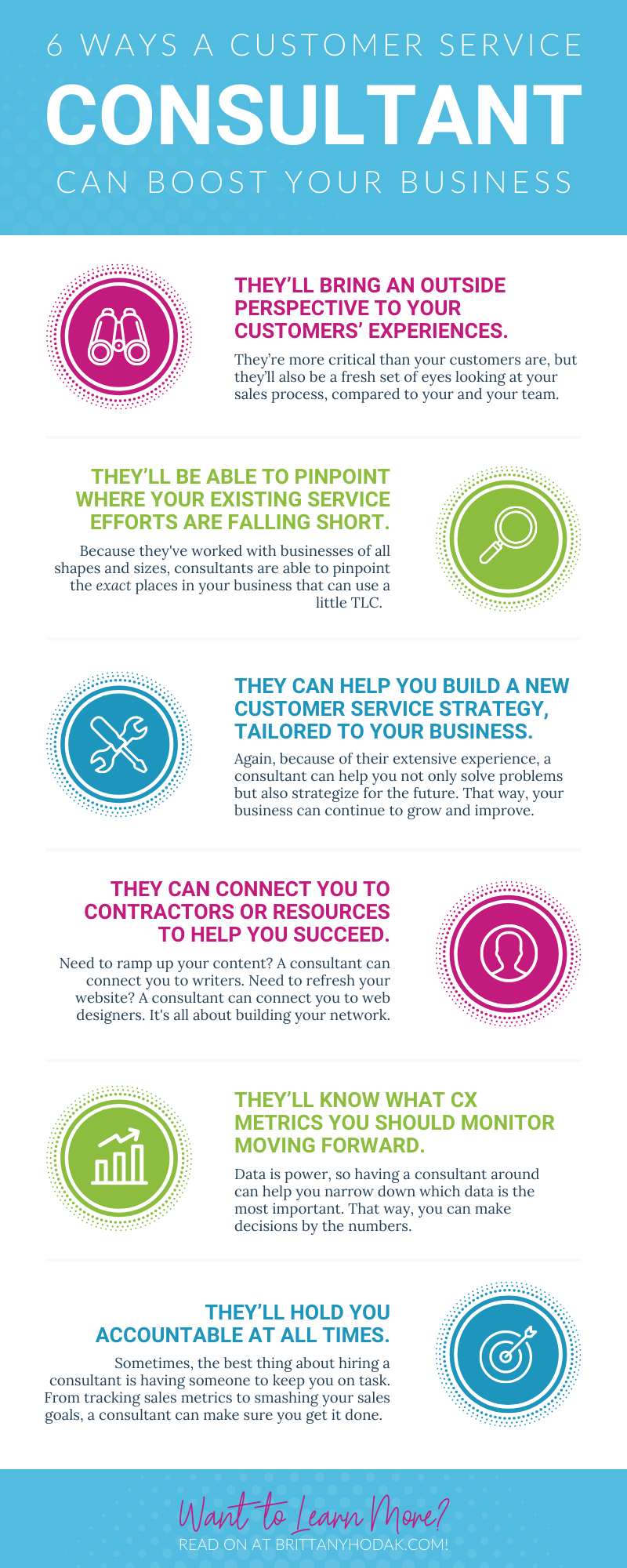Retaining your existing customers is always more profitable than acquiring new customers. More and more companies are beginning to understand the value of investing in customer retention, but this is a long and bumpy road.
A customer service consultant is a professional who knows what it takes to create superfans. These pros help companies retain their existing customers by improving customer-first services and policies. While it might sound obvious to focus on your customers, mastering a big-picture customer experience strategy is easier said than done.
When you’re trying to make an impact, you need a customer service consultant who understands the full spectrum of customer experience. To explain this further, this guide will explore 6 ways a customer service consultant can boost your business no matter where you are today.
- They’ll bring an outside perspective to your customers’ experiences.
- They’ll pinpoint where your existing service efforts fall short.
- They build new customer service strategies tailored to your business.
- They’ll connect you to contractors or resources to help you succeed.
- They know what CX metrics you should monitor moving forward.
- They’ll hold you accountable at all times.
- Is a customer service consultant right for you?
They’ll bring an outside perspective to your customers’ experiences.
If you’re like most brands, you’ve checked in with your company’s customer experience many times. This might be something you review quarterly, yearly, or maybe it’s already an important part of your daily strategy.
That being said, a fresh pair of eyes is always more valuable. When you’re always looking at your own facts and figures, it’s hard to see the big picture from an outsider’s point-of-view.
Since customer service consultants have worked with brands in a variety of fields and at different levels, they’ve seen patterns time and time again. It’s this fresh perspective that’s usually the most powerful for understanding your strengths and weaknesses.
In this day and age, it’s important to have objectivity. A skilled consultant has an objective viewpoint. They don’t worry what other people in the organization might think about these findings, and they’re not biased by company politics or past efforts. In other words, they’re the breath of fresh air you’ve been waiting for.
They’ll pinpoint where your existing service efforts fall short.
Next, it’s important to recognize that a reported 54% of consumers today say they have higher customer service expectations than they had just one year ago. This means it’s no longer good enough to come up with new service efforts blindly. You need a targeted strategy.
Skilled consultants have seen it all. They understand the most common problems because they’ve seen them before. They’ve worked through them. Additionally, they’re highly tuned into your customer’s needs in ways you might not even be aware of yourself.
For example, if your company struggles to get user feedback, there might be a snag in your post-purchase follow-up strategy. If you’re not asking your users the right questions at the right times, this is something a consultant can pinpoint much faster with their outsider perspective.
Because customer service is their sole focus, they have the time and experience to understand your current process, analyze its functionality, and create a new path forward. In a world where repeat customers are worth their weight in gold, this is more important than ever.
They build new customer service strategies tailored to your business.
Third, customer service consultants truly shine when it comes to making a new customer service strategy built for your business. With so-called customer service gurus and marketing pros online nowadays, everyone has an opinion about what it means to have a great strategy.
Unfortunately, customer service isn’t one-size-fits-all. It’s not even one-size-fits-most.
What worked for a big-name retailer might not work for you. In fact, it almost certainly won’t. Your brand needs a strategy tailored to your business’s capabilities, niche, and needs. While it’s true a customer-first approach is always the right idea, there is no magic formula that works every time.
Even within the same industries, you’ll notice stand-out players have their own unique strategies. To see this in action, look at competing multivitamin brands Ritual and Care/Of. Though both companies have similar products and demographics, they still rely on unique customer service strategies.
To start, Ritual focuses on simplified content to ensure the customer is informed at every stage of the subscription process. They encourage customers to reach out online, specifically on social media. This works great for their younger target audience.
On the other hand, Care/Of starts customers with a personalized quiz to determine which vitamins are right for them. From there, they use an on-page chatbot to answer questions right on the page instead of directing users to social channels.
As you can see from these brands, both companies are proactive with their service, but they also follow their own strategy. This is a shining example of why one-size-fits-all never works, and a tailored, trusted approach is key.
They’ll connect you to contractors or resources to help you succeed.
Fourth, your customer service consultant is just one of the many resources at your disposal. Their in-depth knowledge of the industry means they know the right contractors, resources, and tools that will take your brand’s service to the next level.
No business exists in a vacuum. It’s a skill to admit when you need to bring in additional help to move forward. This is especially true for developing companies that aren’t ready to hire a full-time employee to focus on customer service development. A consultant bridges this gap.
For most brands, the solution lies somewhere in between hiring contractors, hiring an employee, and finding the right tools. This could mean any of the following:
- Identifying the right candidate for a full-time position
- Training existing team members in customer service best practices
- Assist with finding and onboarding skilled contractors
- Creating a plan that works with the existing team
- Identifying the best tools, programs, and software to streamline the customer service process
For an outsider to the customer service space, finding and achieving any of the above is time-consuming and costly. On the other hand, a customer service consultant has these tools already in their wheelhouse, saving the brand both time and money.
They know what CX metrics you should monitor moving forward.
Next, a customer service consultant has a deeper understanding of customer experience (CX) metrics. More importantly, they know which metrics matter for your brand. Many brands might have a grasp on their CX, but that doesn’t mean they know how to monitor their progress and move forward in a constructive way.
What are the most important customer experience metrics? While these vary depending on your industry, brand, and business size, the most important ones typically are:
- NPS (Net Promoter Score): This is the percentage of customers who would recommend your company to their own friends and family.
- Sales: Have sales increased over time or since the new CX initiative began?
- Loyalty: Loyal customers are customers who continue to return to make additional purchases rather than going to the competition.
- Engagement: Beyond making a purchase, how do key customers engage with the brand through marketing, social media, and interacting with the website?
- CLV (Customer Lifetime Value): Finally, this refers to how much a single customer is worth to the business over their lifetime. CLV plays a strong role in marketing efforts.
While these terms above might sound confusing, they are indicators of real progress in the customer service space. By analyzing your existing metrics and determining which ones matter the most to your business, you can take real, valuable steps forward.
They’ll hold you accountable at all times.
Last but not least, a customer service consultant holds you accountable. When you’re focusing on our customer-first initiatives yourself, it’s easy to say you’re taking it seriously without putting in the work. You might make some changes at first, but most companies lose motivation after a few months.
A consultant is an outside supporter whose sole job is to take your business to the next level. They won’t be sidetracked by new projects or marketing efforts, and they don’t lose focus. Since this is their only role within your organization, they’re dedicated to seeing real progress.
You can’t afford not to take your customer service seriously. A reported 9 out of 10 consumers will stop buying from a company after 3 or fewer poor experiences.
Even if your business is in need of a complete turnaround, there’s always room for progress. One example of a company that held itself accountable when it came to customer service is Dominos. This well-known pizza chain used to be dead last on consumer taste preferences surveys. Instead of digging in their heels, Dominos invested in their customer service.
By listening to customers, updating their recipes, and asking for customer feedback on social media, Dominos experienced one of the biggest fast-food turnarounds in recent years. Since these changes in 2008, Domino’s stock price has risen 5000%. This is the power of customer service, and this is the type of accountability you get with a consultant.
Is a customer service consultant right for you?
In conclusion, every business needs to focus on customer service in 2021 and beyond. This is the only way to stand out amongst rising levels of competition, and no industry is free from these new expectations.
While it’s possible to create superfans on your own, a consultant is the fastest, most efficient way to revamp your customer-first initiatives no matter where your business is currently. Are you ready to take this next step to improve your brand? Let’s schedule a chat today to discover what your customers really need from you.

